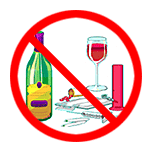Links to Remember
Risk Factors and Strategies to Reduce Risk
In this section, you will find information on how to avoid being a target of crime while abroad in Peru. There are helpful tips on how non–verbal communication–like gestures or manner of dress–can help keep you safer. You will also learn how to become more aware of your surroundings. Based on anecdotal information, most of the incidents resulting in injury or death of students while participating in study abroad involve:
1. General Information

- travel/traffic accidents
- use and abuse of drugs or alcohol
- sexual harassment and assault
- crime/petty theft
- mental health issues/stress
- diseases and illnesses that exist in Peru
Resources and information about each of these issues can be found below. You can find additional information in the Basic Health and Safety section of this Handbook.
 Precautions When Accepting Food and Drink: Be cautious about accepting drinks (alcoholic or non–alcoholic) from a stranger. Be cautious about accepting food from a stranger.
Precautions When Accepting Food and Drink: Be cautious about accepting drinks (alcoholic or non–alcoholic) from a stranger. Be cautious about accepting food from a stranger.- Risk Upon Arrival: Travelers, especially those having just arrived in Peru, are often targets of crime and at higher risk of harm, because they:
- Are unfamiliar with their surroundings
- Might not speak Spanish or the local language well
- Are clearly recognizable as foreigners
- Have not yet learned the social norms or unwritten rules of conduct
- Are eager to get to know new people and the local culture
- Are naive to the intentions of people around them
- Are carrying all their valuables with them when they first step off the plane, train, or boat
 Keeping In Control: In addition to the circumstances involved with being new in a foreign country like Peru, there maybe circumstances which are often beyond one's immediate control. There are many situations that students can control. Some controllable factors that place students at greatest risk include:
Keeping In Control: In addition to the circumstances involved with being new in a foreign country like Peru, there maybe circumstances which are often beyond one's immediate control. There are many situations that students can control. Some controllable factors that place students at greatest risk include:
- Being out after midnight
- Being alone at night in an isolated area
- Being in a known high crime area
- Sleeping in an unlocked place
- Being out after a local curfew
- Being under the influence of alcohol or drugs.
- Verbal and Non–verbal Communication: Non–verbal communication (like body language and hand gestures) considered harmless in the U.S. may be offensive to people in Peru and other countries to which you plan to travel. The list of gestures considered rude in other countries can grow beyond the obvious. For more help communicating in Peru, please see the Communication Sheets.
- Sexually Transmitted Diseases: Keep yourself free from sexually transmitted diseases by using protection (like condoms or abstinence). Also, remember that "no" may not always be interpreted as "no" in Peru and in other countries. Inform yourself about the types of diseases prevalent in the area in which you are studying and the areas in which you will be traveling.
 International Sources of Information: Inform yourself as much as possible about your new environment, making use of as many different sources as possible – online, in the library, on television and radio news programs, and in the paper. Don't limit yourself to U.S. sources. Instead, contrast the U.S. information with that provided by Peru and other countries. Please see "Media" in the Resources section of this Handbook.
International Sources of Information: Inform yourself as much as possible about your new environment, making use of as many different sources as possible – online, in the library, on television and radio news programs, and in the paper. Don't limit yourself to U.S. sources. Instead, contrast the U.S. information with that provided by Peru and other countries. Please see "Media" in the Resources section of this Handbook.- Understanding Locals: Beyond tuning into yourself, make it a point to try to understand what locals are communicating to you, how they feel about you and about U.S. citizens in general, how you are fitting with their values, and how well you understand them. Obviously a stronger grasp of the official language(s) will help you with these things, but even knowing a few essential phrases can be immensely beneficial. Please see the Communication Sheets of this Handbook for Helpful Words and Phrases you should know.
 How to Dress: It is often best to dress conservatively – by local standards, so you can't be identified on sight as a tourist or a U.S. citizen.
How to Dress: It is often best to dress conservatively – by local standards, so you can't be identified on sight as a tourist or a U.S. citizen.- Jewelry and Other Valuables: Be cautious with how you display valuables (does it look like you're flaunting wealth?). Leave your good jewelry at home, and keep money in a safe place like a money belt or hidden pouch under your clothes.
- Becoming Aware of Your Surroundings: You should be aware of your surroundings, remembering to:
- Pay attention to what people around you are saying
- Find out which areas of the city are less safe than others
- Know which hours of night are considered more dangerous
- Stay and walk only in well–lit areas
- Avoid being alone in unfamiliar neighborhoods
- Know where to get help (police station, fire station, phones, stores, etc.)
- Do not touch suspicious items like letters or packages mailed to you from someone you don't know
- Know what is "normal" and "not normal" to see on a daily basis in the areas you frequent
- Do not respond to explosions or gunfire by going to a window; seek cover away from windows and exterior walls
- Political Rallies: Avoid political rallies, which can increase tensions and emotions or breed angry mobs for which a U.S. citizen may serve as a scapegoat.
- Political Conversations: Try not to engage in conversations about contentious political issues with locals and avoid retaliating against hostile or bigoted remarks about Americans.
2. Relevant Questions
- Do your emergency contacts know how to reach you at all times?
- Do your contacts have photocopies of your plane tickets, passport, visa, etc?
- Why might there potentially be a need to evacuate in your particular area (fire, natural disaster, bomb threat, etc.)?
- What types of notification systems are used in the event of an emergency (alarms, flashing warning lights, curfews, lockdowns, etc.)?
- Does your residence, university, etc. provide more than one escape route/exit out of buildings?
- What common tricks or tactics do criminals use in the regions in which you will be traveling?
- Are there high rates of sexual assaults in the areas you will frequent?
- Is it safe to exercise or do outdoor activities on the streets (jogging along roads, running at night, etc.)?
- Is local transportation (metro, buses, taxi cabs, etc.) safe to use?
- Are roads in generally good condition, or are there common road–related problems (overturned buses, potholes, collapsed bridges, etc.)?
3. Checklist
- I know which non–verbal behaviors are considered inappropriate/rude and which are commonly used (certain hand gestures, greeting by bowing, kissing or shaking hands, etc.).
- I know which areas are considered unsafe in the cities I will visit.
- I know which forms of public transportation are safest to use.
- I know where to get help if I need it.
- I have a small flashlight to carry with me at night.
- I have only given out my mailing address to people I know, and those people will inform me before they send me any mail/packages.
- I am aware of the prevailing local attitudes towards, and local laws dealing with, sexual harassment and sexual assault.
- I am aware of any travel advisories issued by the U.S. State Department for the countries to which I will be traveling.
4. Resources
- AllAbroad.us – Women Travelers Mentors talk about traveling as a woman
- Asian Gestures Overview of general nonverbal communication and gestures of Asia
- Aspects of Nonverbal Communication Article on nonverbal communication involving multiple csountries
- Tips for Women Travelers from the Australian Department of Foreign Affairs and Trade Identifies certain risks and hazards for women travelers, such as traveling alone, public breastfeeding and dress codes.
- Canadian Dept. of Foreign Trade and International Affairs Advice for the Woman TravelerUseful information regarding international religious and societal beliefs that generally can effect the female traveler more than male travelers.
- GlobalScholar.us: Go to Course 3, Module 3, Task 5 "Gender Issues" about what you may encounter as a female abroad.
- GlobalScholar.us – Go to Course 1, Module 9, Task 3 – "Unsafe Activities Abroad" to learn about risks involved in certain activities and how reduce those risks.
- JourneyWoman.com Travel tips geared toward women, including everything from personal travel stories to what to wear.
- Keep your hands to yourself Fun and informative quiz involving nonverbal communication in multiple countries.
- SAFETI Adaptation of Peace Corps Resources The following resources were adapted from Peace Corps documents about responding to crises, developing an emergency action plan, personal safety and awareness, and risk management.
- Crisis Management Handbook
- Crisis Management Workbook
- Personal Safety and Awareness Booklet
- Risk Management Workbook
- Sexual Harassment and Prevention in College Students Studying Abroad SAFETI On–line Newsletter article by Nancy Newport, Licensed Professional Counselor and Consultant to the Peace Corps.
- Treatment of Sexual Assault in College Students Studying Abroad SAFETI On–line Newsletter article by Nancy Newport, Licensed Professional Counselor and Consultant to the Peace Corps.
- U.S. Department of State: Worldwide Caution Updated information about continuing threat of terrorist actions
- Understanding Terrorism's Impact on Study–Abroad Programs A SAFETI Newsletter article that helps put terrorism's impact on study abroad into perspective.
COUNTRY SPECIFIC STUDENT HANDBOOKS
Country Specific
Student Handbooks
Sponsors


HTH WorldWide
Peru
Student Handbook
Student Handbook
STUDY ABROAD PROGRAM SEARCH
Study Abroad
Program Search




 Peru
Peru
